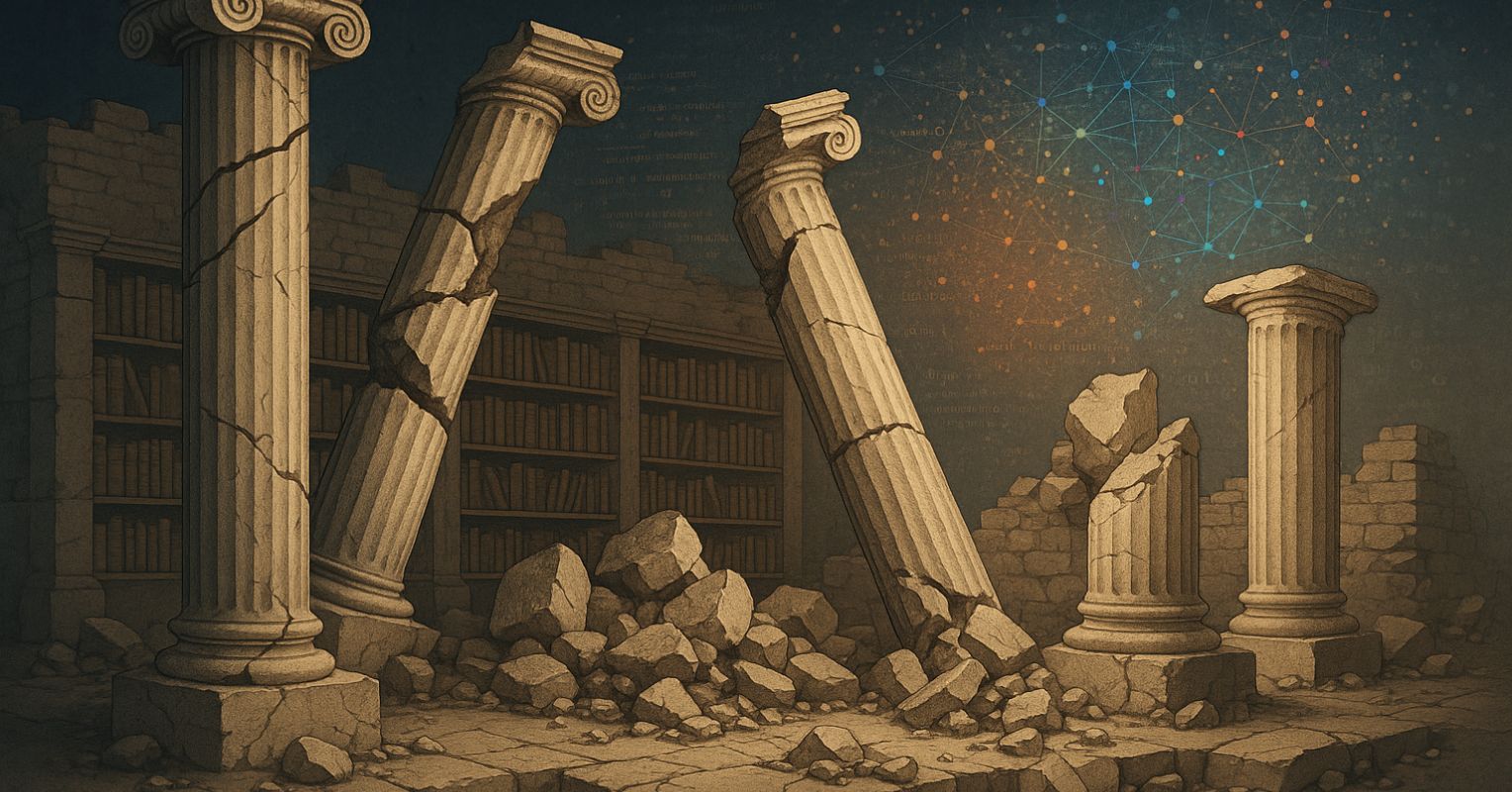
The "knowledge matrix" might describe the high-dimensional space that Generative AI extracts knowledge from. Facts lie in specific coordinates, but the space between may still "resonate" with coherence. Just like generative AI can interpolate realistic but unreal human faces, it can interpolate realistic but unreal facts. Thus any narrative can ring true if it is coherent even if it is not, in fact, true.
## Highlights
When Nietzsche declared that “God is dead,” he [wasn’t referring to theology.](https://philosophybreak.com/articles/god-is-dead-nietzsche-famous-statement-explained/) He was announcing the collapse of the metaphysics that once anchored meaning and [morality](https://www.psychologytoday.com/us/basics/ethics-and-morality/amp). His words didn’t mark the end of belief, but the end of belief in the old form. In a strikingly parallel way, we are now living through a similar upheaval. The death of knowledge isn't a rejection of truth, it’s the collapse of a system that assumed knowledge could be fixed and preserved. ([View Highlight](https://read.readwise.io/read/01k0wdnfybn7dyyb1efhmv7p3w))
---
LLMs don’t retrieve truth, they generate language. They are not repositories of knowledge, they simulate [coherence](https://www.psychologytoday.com/us/blog/the-digital-self/202505/what-if-ai-isnt-like-our-brains/amp). And meaning isn’t pulled from a static archive, it’s created, probabilistically, in context, and on demand. That alone rewires the architecture of how we think. ([View Highlight](https://read.readwise.io/read/01k0wdpa91xfkdfg7frjefff1y))
---
In the map-based model of [cognition](https://www.psychologytoday.com/us/basics/cognition/amp), truth was something you found. You located it in the encyclopedia, the textbook, the peer-reviewed journal. Knowledge was external, and the mind was a storage mechanism.
But LLMs are not maps. They are cognitive environments—what we might now call a knowledge matrix. Ask a large language model a question, and it doesn’t hand you the “correct” answer. It constructs a response in real time, shaped by the interplay of billions of language vectors operating across a digital space.
We are no longer interacting with knowledge as a thing to retrieve. We are co-constructing it in real time. The result isn't information, it’s resonance. Meaning is now [contextual, adaptive, and iterative](https://www.psychologytoday.com/us/blog/the-digital-self/202409/ai-and-the-emerging-role-of-iterative-intelligence/amp). It behaves less like a point on a map and more like a vibration in a field. ([View Highlight](https://read.readwise.io/read/01k0wdq9ws5ftrcjkcte018zyg))
---
The educational model begins to shift. The linear curriculum—the idea that one must master a sequence of static truths—is giving way to a different set of [cognitive priorities](https://www.psychologytoday.com/us/blog/the-digital-self/202412/five-ways-llms-transform-education/amp). ([View Highlight](https://read.readwise.io/read/01k0wdqvb50xnrchpesyy104xt))
---
And today, these are the new literacies.
• **Asking better questions.** Not to extract, but to shape the inquiry and to find the right entry point into a shifting field.
• **Thinking iteratively.** Replacing finality with evolution and understanding that ideas refine themselves through recursive engagement.
• **Embracing ambiguity.** Letting go of binary truths and leaning into the "generative tension" of multiple perspectives.
• **Learning how to learn.** Developing the metacognitive agility to adapt across contexts, synthesize meaning, and build coherence in real time. ([View Highlight](https://read.readwise.io/read/01k0wdra3n354ax2rkx4cm0hyh))
---
We may be entering a world where coherence replaces consensus and where the most valuable form of [intelligence](https://www.psychologytoday.com/us/basics/intelligence/amp) is not what you know, but how you think, in motion. ([View Highlight](https://read.readwise.io/read/01k0wds3bm3etc55pjgnvg1vqc))
---
We are no longer users of knowledge. We are participants in its emergence.
And what rises in its place may be more powerful than anything we’ve left behind. ([View Highlight](https://read.readwise.io/read/01k0wdsnakwcg2wb8kaarffgbf))
---